Catalyzing Curriculum Redesign and Developing a Multicultural, Antiracist K-12 Content Map
CompetencyWorks Blog
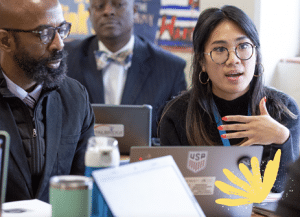
This summer, from June 27 – July 1, reDesign is convening approximately 100 content experts from diverse backgrounds and geographies to launch an effort to reimagine the K-12 content map. In this post, I share why and how we’re doing this. In an earlier post, my colleagues Jon Altbergs and Laurie Gagnon named the virtual impossibility of teaching all of the current standards in a way that is meaningful and authentic for students.
Why are we doing this?
The purpose of this event is to create a prototype of how we might redefine learning outcomes for K-12 education from a multicultural, antiracist perspective, grounded in the learning sciences. It’s not a small bite.
With the support of a generous grant, our small but mighty team at reDesign is going all in on reimagining K-12 learning outcomes—more specifically, the “knowledge domain” of K-12 learning outcomes (see figure below). (We are also working on the “process domain,” but that’s a whole other post!)
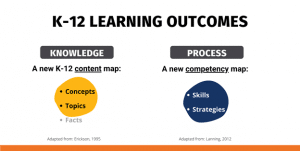
We often say in our field, “What do students need to know and be able to do?” when identifying learning outcomes. If we dig a little deeper into the knowledge domain—what do students need to know—which includes concepts, topics, and facts, we see that not all knowledge is the same or equally important. Conceptual understanding is more important than most topics and facts: it is critical to learning, memory, and building expertise, and forms the “coat hangers” on which new knowledge is interpreted.
Another reason we’re reimagining the content map is that the current map artificially separates too many outcomes into single disciplinary boxes. In fact, we know that many important concepts (e.g., power, patterns, cause and effect) and competencies (e.g., reading critically, conducting research, crafting evidence-based arguments) are by nature multidisciplinary and transferable across contexts.
Some of our big ideas about key features of the K-12 content map redesign include:
- Building diversity and flexibility into pacing, pathways, and topics; moving beyond the current linear, time-based model of standardization (“same age, same page”) while ensuring equally high expectations for all students.
- Centering a multicultural perspective in which schools are places where we can unlearn and disrupt racism (and other isms) and emphasize a sense of belonging for all learners.
- Making the process of building knowledge and competencies more transparent to students, and allowing the learning sciences to shape our approach.
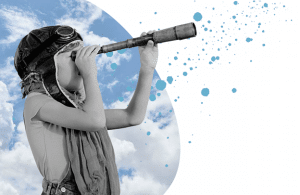
How are we doing this?
Well, we aren’t doing it. Over a hundred folks of diverse identities and geographies with expertise in their content areas, a lived commitment to antiracism, and a vision for equitable, inclusive education are doing this. It’s a rapid prototype of sorts. And because process matters as much as product, let’s talk about how we’re going about this.
- Embrace inclusion.
Our team at reDesign knows well that we don’t have the answers. We don’t even believe there is one answer. Instead of continuing with the status quo, we are pushing for a reimagined K-12 content map that acknowledges and celebrates diversity, and embraces the antidote of inclusion. Our approach has included:
- An open call for content experts, explicitly seeking folks from diverse identities, backgrounds, and careers
- A selection process based on specific and transparent criteria that boil down to demonstrated expertise—measured by one’s contributions to their field, not one’s credentials—and a demonstrated commitment to multicultural, antiracist education
- A commitment to paying people a stipend for their time, and providing multiple levels of engagement to accommodate family and work commitments
-
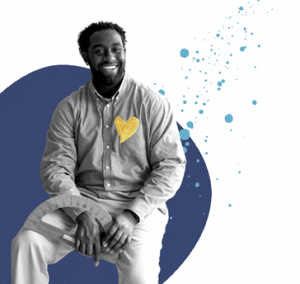 Self-organized teams, supported by skilled “holders of the space.”
Self-organized teams, supported by skilled “holders of the space.”
It was our co-founder and creative director, Dr. Antonia Rudenstine, who conceptualized the virtual design studio model for this event. One of her primary sources of inspiration: The Marlboro Music Festival. Musicians just show up, connect, self-organize, and work on a piece of music together, until it’s ready to perform.
The design studio event will involve ten discipline teams who will engage in their own co-creation process. There’s no script. To ensure safety and support, reDesign has teamed up with VISIONS, Inc. and several other skilled “holders of space” to be present for teams and step in only as needed to navigate complex conversations. Also, reDesign team members will stand by as “support partners” available to help as needed and invited.
- Multiple perspectives.
We’re proposing a map that reflects multiple pathways, multiple perspectives, and even multiple destinations: one that provides learners with both “mirrors” and “windows” that reflect and affirm their identities and lived experiences, while also helping to expand their horizons of understanding across lines of difference. Topics could be flexible and adaptable to honor community values and vision.
- Embrace an iterative, dynamic approach to mapping.
This work will launch with a design studio this summer, but this is just the beginning of the effort to reimagine K-12 standards. We imagine that the map will be iterated on and revised multiple times over the next several years, with opportunities for public feedback and additional expert input. We intend to make the content map versions public, adaptable, and available, with the understanding that it is evolving in real time.
We’re excited! I’ll close by sharing three ways you can support the work and get involved:
- Weigh in! Complete our Community Input Form to share your own ideas for reimagining learning outcomes for K-12 education
- Partner up! We are currently in the process of reaching out to dozens of organizations who share our values of multicultural, antiracist, liberatory education. Reach out to [email protected] if you’re interested in becoming a solidarity partner.
- Stay connected! Sign up to stay up to date on the work and learn of additional opportunities to contribute.
We look forward to sharing what we learn during our week of Design Studios!
Learn More
- Five Big Ideas for Learner-Centered Competency Framework Design
- Let’s Just Say It Out Loud: There Isn’t Enough Time to Cover All the Standards
- How Competency-Based Learning Supports Culturally Responsive Curriculum
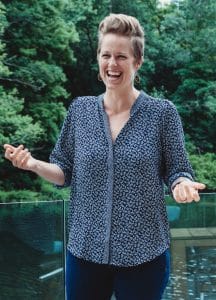 Sydney Schaef is an Educational Designer and Managing Director of reDesign, an education design lab that partners with educators to create learner-centered communities that develop competency, cultivate critical consciousness, and nurture connectedness so that every learner can thrive. Sydney has served as a teacher, school co-founder, nonprofit leader, and district administrator, and has been recognized by the Skoll Foundation for her contributions to innovative education and youth development programming in East Africa carried out in collaboration with local leaders. She holds a doctorate in Educational Leadership from the University of Pennsylvania, a Master of Business Administration from the University of Oxford’s Saïd Business School, a Master of Education from the University of California Los Angeles, and a B.A. from the University of Florida
Sydney Schaef is an Educational Designer and Managing Director of reDesign, an education design lab that partners with educators to create learner-centered communities that develop competency, cultivate critical consciousness, and nurture connectedness so that every learner can thrive. Sydney has served as a teacher, school co-founder, nonprofit leader, and district administrator, and has been recognized by the Skoll Foundation for her contributions to innovative education and youth development programming in East Africa carried out in collaboration with local leaders. She holds a doctorate in Educational Leadership from the University of Pennsylvania, a Master of Business Administration from the University of Oxford’s Saïd Business School, a Master of Education from the University of California Los Angeles, and a B.A. from the University of Florida